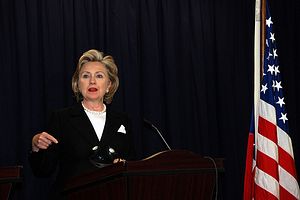Sunday, Hillary Clinton formally entered the 2016 presidential race with a video announcement and social media push. She’ll hit the campaign trail immediately. Traditionally, foreign policy plays a very small part in determining the outcome of American elections. But, ahead of President Obama’s 2015 state of the union address, the Pew Research Center released a poll saying that the share of Americans who rated foreign policy as more important than domestic policy for the president to cover in the speech, doubled from the previous year. Overall, however, that still only amounted to 20 percent of those polled and isn’t necessarily an indication of how Americans will make their decision on the country’s 45th president. Another poll from Pew, indicates that Americans trust Republicans more than Democrats when it comes to issues of terrorism and foreign policy.
Hillary Clinton, with her term as secretary of state from 2009 to 2013, is nonetheless well-positioned to claim the most experience when it comes to foreign policy and especially when it comes to Asia. Michael Fullilove, executive director of the Lowy Institute, said that “the rebalance is Clinton’s signal foreign policy achievement as Secretary of State, she’s invested in it.”
In a massive 2011 piece in Foreign Policy, Clinton outlined what was initially known as the American “pivot” to the Asia-Pacific (later rebranded as a “rebalance”). She’d used the term before and in fact she and the president had made multiple trips to the region in the previous two years, engaging in what she called in 2010 “‘forward-deployed’ diplomacy.” The title of the FP article–America’s Pacific Century–succinctly articulated the administration’s larger strategic vision. The Asia-Pacific, Clinton wrote, “has become a key driver of global politics” and “U.S. commitment there is essential.”
Clinton categorized the rebalance strategy as having three elements:
We are practicing robust regional engagement in the Asia-Pacific, we are working to build trust between China and the United States, and we are committed to expanding economic, political, and security cooperation wherever possible.
In the same speech, a lecture on U.S.-China Relations in the 21st century delivered in 2011, Clinton addressed the proverbial elephant in the room directly:
Some in the region and some here at home see China’s growth as a threat that will lead either to Cold War-style conflict or American decline. And some in China worry that the United States is bent on containing China’s rise and constraining China’s growth, a view that is stoking a new streak of assertive Chinese nationalism. We reject those views.
In that speech Clinton admitted that the U.S. and China “are two complex nations with very different histories, with profoundly different political systems and outlooks” and while this does not necessarily preclude cooperation, cooperation also does not preclude competition.
Although a considerable proportion of Americans don’t seem to be completely aware of territorial disputes between China and its neighbors (39 percent said they heard “nothing at all” about such disputes, according to a recent survey), Clinton is definitely aware of them, and other Asian flashpoints. This is where the first and third elements of the original pivot policy come into play–regional engagement and cooperation to tackle global challenges in the economic, political and security spheres.
In 2010 remarks, made after meeting with ASEAN ministers for two days, Clinton outlined the American perspective on the South China Sea issue, saying that “the United States, like every nation, has a national interest in freedom of navigation, open access to Asia’s maritime commons, and respect for international law in the South China Sea.” She went on to say:
The United States supports a collaborative diplomatic process by all claimants for resolving the various territorial disputes without coercion. We oppose the use or threat of force by any claimant. While the United States does not take sides on the competing territorial disputes over land features in the South China Sea, we believe claimants should pursue their territorial claims and accompanying rights to maritime space in accordance with the UN convention on the law of the sea. Consistent with customary international law, legitimate claims to maritime space in the South China Sea should be derived solely from legitimate claims to land features.
In early 2009, Clinton made her first trip abroad as secretary of state. In that first trip, during her visit to Indonesia, Clinton met with ASEAN Secretary-General Dr. Surin Pitsuwan, who commented that her “visit shows the seriousness of the United States to end its diplomatic absenteeism in the region.”
In her own remarks, Clinton acknowledged the skepticism in the region regarding American commitment.
And we have listened to our friends in ASEAN. They have expressed their concern that the United States has not been fully engaged in the region at a time when we should be expanding our partnerships to address the wide range of challenges confronting us, from regional and global security, to the economic crisis, to climate change and human rights.
That skepticism has persisted among the United States’ partners in the region, just as China continues to harbor the suspicion that “rebalance” is merely “containment” by another name. The next U.S. president will have to decide what to do with the Asia rebalance policy which has been left in mid-step, pushed aside in U.S. domestic headlines by ISIS, Iran, and Russia. The growing importance of Asia in the next century is not disputed, what the next U.S. president should do about it certainly is. Whether Clinton would continue to pursue the Asia rebalance strategy she helped build as secretary is a question worth asking as she tries her hand at winning the White House in 2016.

































